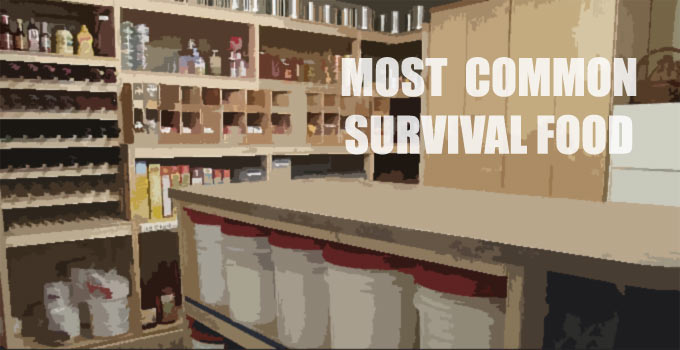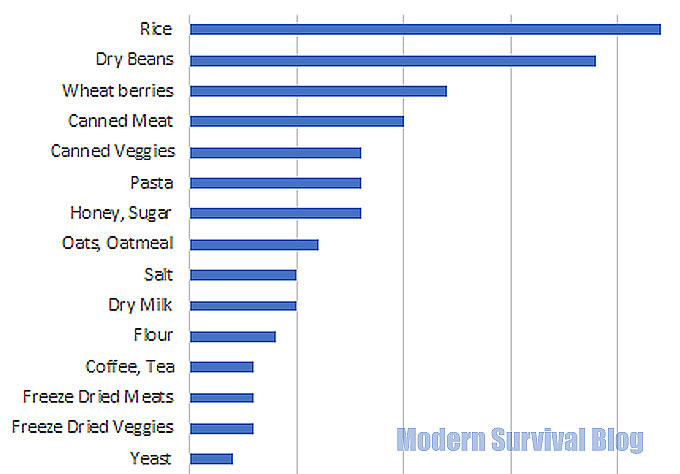Survival Food Most Common In Preppers Deep Pantry Storage

Which survival food choices are the most common?
If all preppers were able to peek into the deep pantry food storage of others, what survival food types would be the most commonly found?
What is Survival Food?
It’s any food that you have purposely acquired and set aside (or rotate through) for preparedness.
Typically a well thought out storage of survival food will include a variety of foods and food types. Not just a case of MRE’s and we call it good…
Someone might choose to purchase a professional ready made survival food kit for long term storage. They’re available in all sorts of sizes (e.g. month, 3 months, 1 year). Chances are though that this someone will also acquire additional survival food to diversify their preparedness (highly recommended).
Other short and long term food storage acquisitions can simply be made at your local grocery store!
Some food will have a relatively short shelf life (months, a year or two) while others if packed right will potentially store for years or a decade or more.
Most survival food can be grouped as follows:
– dry goods, bulk (e.g. rice, beans)
– professionally canned (grocery store)
– home canned (DIY)
– dehydrated (professional or DIY)
– freeze dried (professional or DIY)
Related:
Ordinary Canned Food For Preparedness
Food Storage Mistakes To Avoid
Dehydrated Food versus Freeze Dried Food
Then you can get into specific foods and food types. The choices are nearly endless.
It all depends on what you want, storage and shelf life considerations, and the span of time that you’re gearing up for.
Caloric content and nutritional diversity are important considerations too!
Some foods are very calorie dense, which is great for survival. However those particular high calorie foods may not be ideal for long term consumption.
Most preppers don’t just stock up on one type of food. We diversify. Better nutrition will also come from a wider variety of choices kept in your deep pantry.
Popular Survival Food
So let’s get into it.
I could go about it two ways. I could present a huge list of foods and POLL you on what you think the most popular would be. Or I could simply ask what you would find if you had a look at other prepper’s food storage.
Here’s what I’ll do:
In the comments below, list the Top 5 survival food items that you suspect you’d find in other prepper’s storage. List more than five if you’d like.
Once I have a good list of replies then I will tally them into an ordered list to append to this article. Should be interesting…
To make it easier for me, reply with a numbered list according to your opinion.
Be specific regarding the food most likely found. Otherwise it won’t be counted.
Augason Farms 30-Day Emergency Food Storage Supply
Augason Farms Lunch & Dinner
Popular Survival Food
The following list of deep pantry survival food is a result of my best general tally of the reader comments below.
There was some confusion among the responses whereby many simply listed the survival food that they had in their own pantry. That’s okay though. It all led to a list of foods that are probably most likely to exist in prepper pantry deep storage.
Of course there are lots more specifics than what is listed here which could also lead to lots of specific recommendations. However I just wanted to capture a general opinion.
Here are the results (Top 10)
1. Rice
2. Beans (dry)
3. Wheat berries
4. Canned Meat
5. Canned Veggies
5. Pasta
5. Honey / Sugar
6. Oats
7. Salt
7. Dry Milk
8. Flour
9. Coffee / Tea
9. Freeze Dried Meats
9. Freeze Dried Veggies
10. Yeast

